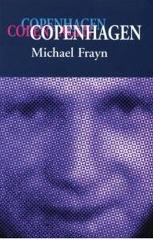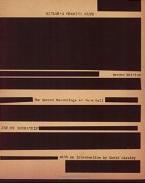Uranverein

I never saw the play "Copenhagen" in a
drama theater: I only read the
script last semester during one of my
visits to Cambridge when I binged
on a pile of books from the local
Waterstones to get me through a couple
of sleepless nights (the play went along
in my night time readings with an ill
conceived assortment of other books from
Lem's "Highcastle" to Burroughs' "Junkie").
I was especially struck by Frayn's book.
Not just by the beautifully conceived play
itself, set in an atemporal setting
where the characters (Bohr, Heisenberg
and Bohr's wife) remember and reinterpret
the famous and mysterious Copenhagen
encounter in all its possible ambiguities
and contrasting perspectives (a kind of
Rashomon of the nuclear age), but also,
or perhaps especially, by the extended
commentary added by Frayn at the end
of the book. The play leaves all the
ambiguities intact as a kind of
unresolvable uncertainty principle of
history and quantum physics alike.

Prompted by the commentaries that accompany
Frayn's play, I got hold of an even more
interesting book, which I bought on my
subsequent return to the US, namely the
collection of the transcripts of the
Farm Hall recordings.
These are secret recordings that the
British army and intelligence did of
conversations that took place among the
scientists of the German nuclear program
(Heisenberg's Uranverein) during the six
months of their internment at Farm
Hall near Cambridge at the end of the war.
The transcripts were kept as classified
material for a long time, then finally
released in a British edition (without
commentary) and an American edition
accompanied by an extensive set of footnotes
and commentaries by Jeremy Bernstein.
I just spent a few days around Holland, and
in between giving talks and trying to do some
research, and not being quite on the right
time zone to sleep at night, I managed finally
to read through the Fine Hall recordings in
full.
These conversations are far more revealing
of the history of the German attempt at
building nuclear weapons during World
War II than any other available document.
So, from what one can infer by the reading of
these beautiful reports, why did the Germans
not build a nuclear weapon? In essence, it
seems, because of their arrogance. All along
the story of the Uranverein, the German scientist
were convinced that they were surely far ahead
of their enemies in the undestanding and
manipulation of nuclear fission. They took their
own difficulties at building a reactor, let along
a bomb, as a sign that the task would have been
impossible for anybody else to achieve. Even when
there were clear signs that the allies knew of
their activities (the commando attack on the
heavy water production plant in Norway) and that
therefore must have had themselves a clear knowledge
of what kind of nuclear reseach was being attempted,
they took no action. Hubris. Arrogance of the single
individuals involved, who put hierarchical structures
and official titles before competence and intelligence.
(Sounds familiar, doesn' it? Ever been in a German
university today?) Heisenberg himself was a brilliant
theoretical physicist, essentially a mathematician,
the only person capable of thinking in a truly
quantum mechanical manner. The problem with that is
that, unlike what the layperson may think,
mathematicians are typically very bad with numbers.
They understand and manipulate easily abstract
structures (that's what mathematics is all about)
but they would not be able to estimate an order
of magnitude correctly for their life's sake. So
was Heisenberg. What was a guy like that doing at
the head of a project that proved to be an
incredibly delicate task for a most experiences
experimental and engineering wizard like Fermi,
accompanied by a pool of the best physicists and
engineers of the US secluded at Los Alamos?
Oppenheimer did not want Pauli in his Los Alamos
team for much the same reason (well, ever heard of
the Pauli effect? His very presence was supposed to
make any experiment in any lap fail. No wonder
they didn't want the guy anywhere near the A-bomb).
If Oppenheimer was himself much of a theoretician
and somewhat of an abstract guy (what about his
flirting with Sanskrit poetry?) there is a very
big difference in what it means to be the head of
a project in the Los Alamos environment and what
it meant for Heisenberg to be the head of the
analogous German enterprise. Well, take a look at
the world of today. If in many US university a
department chair is meant to be a filter that
protects the scientists against bureaucracy and
administration allowing them to do their actual job,
being the head of anything in Germany means that a
power structure rigidly imposed on all the people
down the line of command from the boss.
It appears clearly, by taking a close look at
the history of the Uranverein, that many crucial
mistakes (dismissing graphite as a moderator in
favor of heavy water, the poor design of the
prototype reactor with plates instead of spherical
shells, the failure of realizing an efficient
isotope separation methods) were typically due
to good ideas coming from the junior researchers
in the project not filtering up along the
hierarchical scale and being dismissed by
less competent people in charge. One can
argue after the fact whether such dismissals
of good ideas consisted of interional sabotage
or not. There is no trace of such moral dilemma
in the Fine Hall conversations, while there
is plenty of evidence of the simpler explanation
that the nuclear program fell victim to
the rigidly structured German academic system.
Heisenberg did indeed hinder the progress of
Germany towards a nuclear bomb, but, it appears,
not so much due to a moral dilemma as to the
fact that Herr Professor Doktor
would never admit to incompetence, even when
asked to direct a program which is well
outside his domain of expertise. Mind it,
most of those German physicists involved
in the nuclear program, including Heisenberg
and Hahn were far from being Nazi fanatics.
Some of them like von Lahue were known anti-Nazi,
just like there were well known left wing
socialist sympatizers among the Los Alamos
people and not all of them were crazy
militaristic fascists. However, the German
physicists were German professors in their
own natural environment of hierarchical
power structures, prestige unchecked by
actual competence, unchallenged authority.
The American team, altough partially
made of former German physicists (most
of them Jews) escaping occupied Europe,
worked with very different premises and
modalities, far more suitable for science,
where the concept of authority has no value
and any claim is subject to challenge and
discussion and where academic titles mean
very little in themselves.

